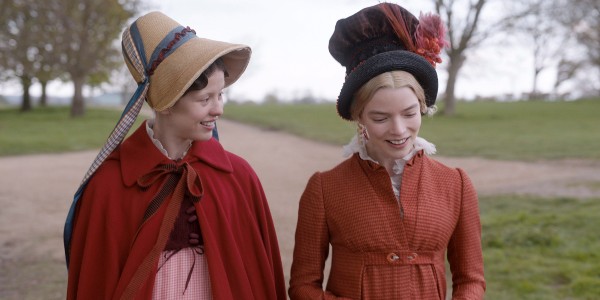EMMA: Gossip, Regal Mayhem & Love

Lee is a filmmaker and writer, currently juggling university and…
Autumn de Wilde’s Emma is a comedy-drama masterpiece that is able to seamlessly adapt the Jane Austen novel with all the nuance and pizzazz that it deserves. Although the dialogue of the times can often be considered inaccessible to viewers who are unfamiliar with the British Regency era, the comedy and romance come with ease, through every whispered word, heightened laugh, and secret glance. Everything from the elaborately decorated costumes and the intricate framing to the swelling score perfectly absorb the audience into the world; soon, our lives become interwoven with Emma’s without fail, and we begin to see her as more of a friend than anything else.
The film follows the life of Emma Woodhouse, played by horror darling Anya Taylor-Joy, a wealthy woman who lives with her father in their countryside home of Hartfield, near the village of Highbury. Described as “handsome, clever, and rich”, Emma stands out amongst the average early-Victorian protagonists, being a young woman of wit and humor, as well as a deeply flawed character. Along with curling her hair and banter with her sister’s brother-in-law, Mr. Knightley (Johnny Flynn), Emma enjoys playing matchmaker with the people in her life, pairing them together as she sees fit. Although Emma has genuine intentions to find happiness for the people she cares about, there’s no doubt that she derives her own pleasure from her ventures in weaving romance amongst her peers.
Handsome, Clever and Rich
When her governess, Miss Taylor, marries and moves away, Emma finds a new companion in Harriet Smith (Mia Goth), a poor, younger girl for whom Emma thinks she can find the perfect match. Whether it’s an attempt at genuine companionship or a way to entertain herself, we don’t exactly know. She convinces Harriet to turn down Mr. Smith (Connor Swindells) and instead pursue the affections of the local vicar, Mr. Elton (Josh O’Connor), which ends disastrously. In between trying to find the perfect match for Harriet and also fighting her own blossoming feelings for Mr. Knightley, Emma attempts to fix the problems her often-impulsive matchmaking cause and trying to find a happy ending for Harriet, as well as herself.

As a protagonist, Emma is unlike what we tend to expect from Regency-era stories, in every way. She has a wit and comedy that rise above what many would consider appropriate, not letting her femininity hold her back from her beloved games, where she finds solace in finding lasting marriages for the people around her. In her gorgeous, pastel attire and carefully-styled hairdo, she seems to be the perfect picture of elegance in British high society. However, she cares deeply for her elderly father (Bill Nighy), to the point where she detests the idea of marrying for herself, as she wishes to stay with him in their country home. Many of her relationships, although often consisting of her making decisions and trying to weave together a romance, seem to be an attempt for her to find genuine companionship for herself once her governess leaves.
Taylor-Joy plays her with all the nuanced snark and intelligence that she deserves; every facial expression, whether it be a crook of the eyebrow or a smirk, dominates the energy of each and every shot she’s in. These cheeky expressions are only exacerbated with the swelling and speediness of the score that marks these more comedic moments, which contrast with the more slow, emotional scenes. Taylor-Joy takes every opportunity to linger in these special moments; since we scarcely see Emma in a truly vulnerable state, these scenes appear to be more intimate than most, almost like we shouldn’t be looking. However, since they come near the end, it feels like on our journey with Emma through the film, we have becoming more deserving to see these parts of her.
An Unlikely Friendship
In contrast with Emma’s sharp cleverness, Harriet Smith seems altogether quite aloof, willing to go along with the majority of her ideas and schemes for most of the movie. Born to unknown parents, Harriet’s education has been provided for; Emma quickly befriends her, and attempts to find her perfect match. This effort quickly goes awry, as Emma convinces Harriet to turn down Mr. Martin, a local farmer, and instead place her affections and hopes into Mr. Elton, a vicar. Harriet quickly falls for him but, when his affections are not returned, she is devastated, leading Emma to attempt to set her up with Frank Churchill (Callum Turner).

Emma’s interactions with Harriet begin as a way to seemingly cause some excitement in her life, allowing her to find a way to escape her own problems for the sake of Harriet’s love life. However, this slowly blossoms into a very true friendship, as Harriet and Emma grow closer, and become good friends. Goth plays Harriet with a very innocent, sweet demeanor, but with a quick sort of perceptiveness that allows her to bite back with her own self-confidence. Although sensitive and empathetic, Harriet’s heartbreak is very easy to sympathize with. We’ve all been Harriet Smith, and we’ve had our fair share of Mr. Eltons that we have high expectations from; our friends urge us to make a move, we get excited, and then? A swift heartbreak that both shocks us and tears us down.
Goth and Taylor-Joy have remarkable chemistry onscreen and play off each other’s strengths fantastically. Harriet is the pure heart behind Emma’s sly plans, which flow from mischievous undertakings to a genuine want to see her best friend happy. At the same time, Emma is the voice of reason when Harriet is trying to get over Mr. Elton, acting as a pillar of support, and trying to help her move on and look for love elsewhere, rather than where it clearly will not blossom into anything beyond fruitless pining. Together, they make an unlikely but altogether extremely lovable pair. They’re both willing to make great sacrifices for each other; in fact, the only other love that seems anywhere near as crucial is the relationship between Emma and Mr. Knightley.
A Regency Romance, Indeed
As Emma is often in the clouds with her quick readings of the people around her and what she feels is best for them, it seems what she needs most is someone to step in and knock her down a few pegs when she really oversteps boundaries. Enter: Mr. Knightley. He can bite back at Emma’s stark with equal fervor, correcting her when needed. Being an older, lifelong friend, Mr. Knightley is able to provide a figure of maturity and morality, along with truly knowing her as a person. If Emma grounds Harriet, then Mr. Knightley grounds Emma.
When Emma carelessly lets her tongue slip and insults Miss Bates (Miranda Hart), it is Mr. Knightley who chides her for her actions and urges her to apologize. He warns her against falling for Mr. Churchill, although it is unclear whether this stems from jealousy or genuine disdain for his character. Above all, he remains a constant authority figure in her life, clearly wanting what is best for her, no matter what that might mean for himself.

Between their quick-witted banter and disagreements, Emma finds herself falling in love with Mr. Knightley, and him with her. Despite always claiming to be above the idea of marriage, and wanting to stay with her father, he is the only one that allows her to let her guard down. Their dynamic is especially interesting because it transforms from a comfortable, friendly relationship to one that is so much more. In this, it diverges from something engulfed in normalcy to something altogether new. The direction is able to not only smack dab us right in the middle of an old friendship but see it move and change without any real forcing. Emma doesn’t even realize she is in love with Mr. Knightley until Harriet suggests possible feelings towards him, and she is faced with a confusing dislike for this fact.
Emma: A Modern Romance
A crucial aspect of Emma is the way it translates so effortlessly to our modern day. Autumn de Wilde‘s film, however encased in high British dining and intricately-decorated Regency era costumes, does not seem too far off from anything we could have experienced in our own lives. Whether it’s being frustrated about the object of our friend’s affections liking someone else, or finding love pop up as a surprise during a time where we least expect it, Emma has the ability to hit at our most guarded parts. We can all find ourselves in Emma, who seems more like a friend than anything at the end. Its period setting decorates the film beautifully, but it also shows how love, despite all the world’s changes remains relatively the same.
Emma was released on March 6, 2020. You can currently watch it on streaming platforms such as Vudu, Google Play, Amazon, Microsoft, iTunes and Youtube Movies.
Does content like this matter to you?
Become a Member and support film journalism. Unlock access to all of Film Inquiry`s great articles. Join a community of like-minded readers who are passionate about cinema - get access to our private members Network, give back to independent filmmakers, and more.
Lee is a filmmaker and writer, currently juggling university and their own projects.













